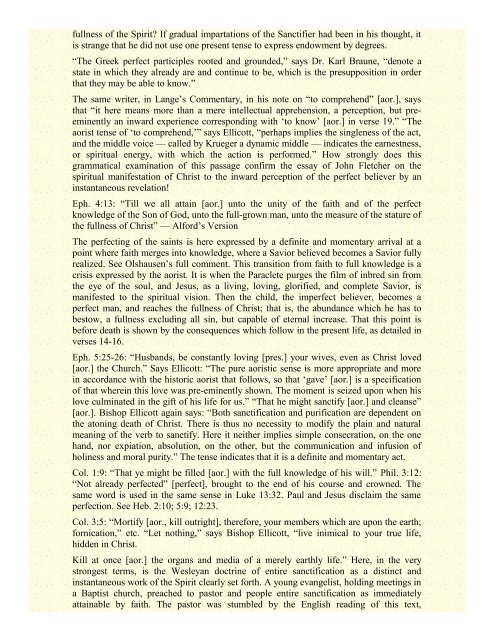2. The Meaning of Sanctification - Enter His Rest
2. The Meaning of Sanctification - Enter His Rest
2. The Meaning of Sanctification - Enter His Rest
Create successful ePaper yourself
Turn your PDF publications into a flip-book with our unique Google optimized e-Paper software.
fullness <strong>of</strong> the Spirit? If gradual impartations <strong>of</strong> the Sanctifier had been in his thought, it<br />
is strange that he did not use one present tense to express endowment by degrees.<br />
“<strong>The</strong> Greek perfect participles rooted and grounded,” says Dr. Karl Braune, “denote a<br />
state in which they already are and continue to be, which is the presupposition in order<br />
that they may be able to know.”<br />
<strong>The</strong> same writer, in Lange’s Commentary, in his note on “to comprehend” [aor.], says<br />
that “it here means more than a mere intellectual apprehension, a perception, but preeminently<br />
an inward experience corresponding with ‘to know’ [aor.] in verse 19.” “<strong>The</strong><br />
aorist tense <strong>of</strong> ‘to comprehend,’” says Ellicott, “perhaps implies the singleness <strong>of</strong> the act,<br />
and the middle voice — called by Krueger a dynamic middle — indicates the earnestness,<br />
or spiritual energy, with which the action is performed.” How strongly does this<br />
grammatical examination <strong>of</strong> this passage confirm the essay <strong>of</strong> John Fletcher on the<br />
spiritual manifestation <strong>of</strong> Christ to the inward perception <strong>of</strong> the perfect believer by an<br />
instantaneous revelation!<br />
Eph. 4:13: “Till we all attain [aor.] unto the unity <strong>of</strong> the faith and <strong>of</strong> the perfect<br />
knowledge <strong>of</strong> the Son <strong>of</strong> God, unto the full-grown man, unto the measure <strong>of</strong> the stature <strong>of</strong><br />
the fullness <strong>of</strong> Christ” — Alford’s Version<br />
<strong>The</strong> perfecting <strong>of</strong> the saints is here expressed by a definite and momentary arrival at a<br />
point where faith merges into knowledge, where a Savior believed becomes a Savior fully<br />
realized. See Olshausen’s full comment. This transition from faith to full knowledge is a<br />
crisis expressed by the aorist. It is when the Paraclete purges the film <strong>of</strong> inbred sin from<br />
the eye <strong>of</strong> the soul, and Jesus, as a living, loving, glorified, and complete Savior, is<br />
manifested to the spiritual vision. <strong>The</strong>n the child, the imperfect believer, becomes a<br />
perfect man, and reaches the fullness <strong>of</strong> Christ; that is, the abundance which he has to<br />
bestow, a fullness excluding all sin, but capable <strong>of</strong> eternal increase. That this point is<br />
before death is shown by the consequences which follow in the present life, as detailed in<br />
verses 14-16.<br />
Eph. 5:25-26: “Husbands, be constantly loving [pres.] your wives, even as Christ loved<br />
[aor.] the Church.” Says Ellicott: “<strong>The</strong> pure aoristic sense is more appropriate and more<br />
in accordance with the historic aorist that follows, so that ‘gave’ [aor.] is a specification<br />
<strong>of</strong> that wherein this love was pre-eminently shown. <strong>The</strong> moment is seized upon when his<br />
love culminated in the gift <strong>of</strong> his life for us.” “That he might sanctify [aor.] and cleanse”<br />
[aor.]. Bishop Ellicott again says: “Both sanctification and purification are dependent on<br />
the atoning death <strong>of</strong> Christ. <strong>The</strong>re is thus no necessity to modify the plain and natural<br />
meaning <strong>of</strong> the verb to sanctify. Here it neither implies simple consecration, on the one<br />
hand, nor expiation, absolution, on the other, but the communication and infusion <strong>of</strong><br />
holiness and moral purity.” <strong>The</strong> tense indicates that it is a definite and momentary act.<br />
Col. 1:9: “That ye might be filled [aor.] with the full knowledge <strong>of</strong> his will.” Phil. 3:12:<br />
“Not already perfected” [perfect], brought to the end <strong>of</strong> his course and crowned. <strong>The</strong><br />
same word is used in the same sense in Luke 13:3<strong>2.</strong> Paul and Jesus disclaim the same<br />
perfection. See Heb. 2:10; 5:9; 12:23.<br />
Col. 3:5: “Mortify [aor., kill outright], therefore, your members which are upon the earth;<br />
fornication,” etc. “Let nothing,” says Bishop Ellicott, “live inimical to your true life,<br />
hidden in Christ.<br />
Kill at once [aor.] the organs and media <strong>of</strong> a merely earthly life.” Here, in the very<br />
strongest terms, is the Wesleyan doctrine <strong>of</strong> entire sanctification as a distinct and<br />
instantaneous work <strong>of</strong> the Spirit clearly set forth. A young evangelist, holding meetings in<br />
a Baptist church, preached to pastor and people entire sanctification as immediately<br />
attainable by faith. <strong>The</strong> pastor was stumbled by the English reading <strong>of</strong> this text,









